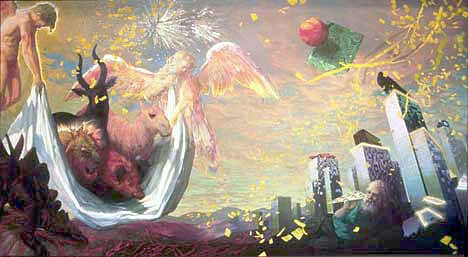Synchronicity is a funny thing.
Been wanting to write this post for a few days, but put it off. Then, on a “lark,” I listened to the podcast of Phil Vischer (of Veggie Tales fame). Having never heard the podcast before, I hoped it might nonetheless prove enlightening, especially since it talks about contemporary issues in the Church. And hey, so do I. 😉
Phil and cohosts Christian Taylor and Skye Jethani discussed a Hell House, the Christianized version of a haunted house, and how kits are now available to help churches use this “evangelistic tool.” Jethani notes that when we see the Gospel presented in Acts and Paul’s outline in 1 Corinthians 15, the apostles “fail” to mention hell or heaven, nor is sin discussed in the majority of presentations, yet what we preach today would focus on all three. Why is our presentation so unlike that of the apostles?
That in itself is a loaded question, but then Jethani hits my issue.
A speaker from Gospel for Asia came to my church Sunday. I support that organization (see the sidebar) because it’s doing a great work getting native missionaries to remote areas in Asia untouched by the Gospel. The numbers the speaker quoted regarding how many are coming to Christ in Asia were staggeringly large. And yet, all the while this man spoke, I kept wondering how it is that America never sees anything like that kind of explosive growth despite having so many “native” missionaries. How is it that we can’t preach the Gospel in a way that resonates with lost Americans?
The podcast clip below starts as Jethani and Taylor discuss what is not working with our Gospel presentation.
Jethani references the late Dallas Willard’s Vision, Intention, and Means concept to explain how Americans Christians are overloaded with means for growing in Jesus. The problem is that we lack vision for who Jesus is and subsequently have made pale substitutions of practical desires.
Yes.
If we Christians in America do not have a clear vision of who Jesus is, then we cannot communicate that vision to anyone else. As a result, if people already have a means for achieving personal desires, they won’t consider Jesus at all.
And this is the problem we find ourselves in.
Worse, Christians who default to seeing Jesus solely as a means for achieving personal desires (even the desire of heaven) will be unable to communicate the Gospel to people because that means of achieving those desires may not be as effective as the means chosen by that lost person. In short, we set ourselves up for having to be seen as a greater success in life than that lost person or else our “gospel” will fail. I’ve written about this before, but Jethani puts it all into the proper “lack of vision of Jesus” framework.
If the Church can’t communicate a real vision for Jesus and downplay this mentality of Jesus as desire-granter, then we will never understand what the Christian life is genuinely about.
Note that I did not say that Jesus never grants people’s desires. But any desire outside of Jesus as our unequaled primary desire is going to distort and weaken the Gospel message.
The American Church has got to stop with all the self-help and personal fulfillment junk and get back to raising up Jesus and focusing on relationship with Him. Nothing else matters.

